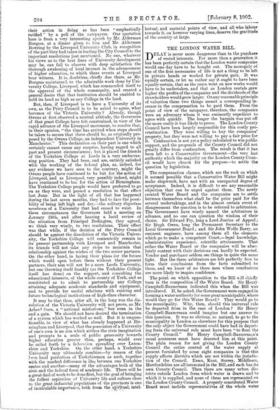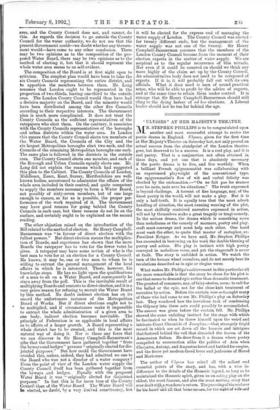THE LONDON WATER BILL.
DELAY is never more dangerous than in the purchase of vested interests. For more than a generation it has been perfectly certain that the London water companies would one day have to be bought out. The monopoly of one of the first necessaries of life is not a thing to be left in private hands or worked for private gain. It was equally certain, or let us rather say it ought to have been equally certain, that as the years went on new works would have to be undertaken, and. that as London rentals grew higher the profits of the companies and. the dividends of the shareholders would grow larger. On any reasonable principle of valuation these two things meant a corresponding in- crease in the compensation to be paid. them. From the point of view of the ratepayer, therefore, the companies were an adversary whom it was eminently expedient to agree with quickly. The longer the bargain was put off the more costly it was likely to prove. The London County Council have been largely responsible for this costly pro- crastination. They were willing to buy the companies' property, but they were not willing to pay a fair price for it. Confiscation is not yet a policy calculated to win public support, and the proposals of the County Council did not greatly differ from confiscation. The result is that it has been left to a Conservative Government—the very last authority which the majority on the London County Colin- cil would have chosen for the purpose—to settle the question by legislation.
The compensation clauses, which are the rock on which it seemed possible that a Conservative Water Bill might make shipwreck, have met with an unexpected degree of acceptance. Indeed, it is difficult to see any reasonable objection that can be urged against them. The newly created Water Board and the companies are to settle between themselves what shall be the price paid for the several undertakings, and in the almost certain event of disagreement the question is to be referred. to arbitration. The Government have wisely named the arbitrators in advance, and no one can question the wisdom of their choice. Sir Edward Fry, long a Lord Justice of Appeal ; Sir Hugh Owen, long the Permanent Secretary to the Local Government Board ; and Sir John Wolfe Barry, an eminent engineer, have among them all the elements which go to make a competent °Court,— legal knowledge, administrative experience, scientific attainments. That either the Water Board or the companies will be abso- lutely content with their decisions can hardly be expected. Vendor and. purchaser seldom see things in quite the same light. But the three arbitrators are left perfectly free to form their conclusions from the facts submitted . to them, and we know of no three men whose conclusions are more likely to inspire confidence.
The point on which opposition to the Bill will chiefly turn is the composition of the Water Board. Sir Henry Campbell-Bannerman indicated this when the Bill was introduced. If, he asked, the Government were engaged in forming a water authority for some great municipality, where would. they go for this Water Board ? They would go to the municipality. Why, then, should this universal rule be departed from in the case of London ? Sir Henry Campbell-Bannerman could imagine but one answer to this question. It was so obvious, so natural, to go to the municipality in London as elsewhere for this purpose that the only object the Government could have had in depart- ing from the universal rule must have been "to flout the County Council." Sir Henry Campbell-Bannerman's usual acuteness must have deserted him at this point. The plain reason for not giving the London County Council the entire control of the water supply at present furnished by some eight companies is that-this supply affects districts which are not within the jurisdic- tion of the Council. Essex, Kent, Surrey, Middlesex, Hertfordshire are all interested in the Bill, and each has its own County. Council. Then there are many urban dis- tricts outside London from which water is drawn and to which it is supplied, and none of these are represented on the London County Council. A properly constituted Water Board must include representatives of the whole water area, and the County Council does not, and cannot, do this. As regards the decision to go outside the County Council for the water authority, we do not see that the present Government could—we doubt whether any Govern- ment would—have come to any other conclusion. There may be , two opinions as to the composition of the pro- posed Water Board, there may be two opinions as to the method of electing it, but that it should represent the whole water area seems to us self-evident.
The composition of the Board is at first sight open to criticism. The simplest plan would have been to take the six County Councils representing the entire district, and to apportion the members between them. Mr. Long assumes that London ought to be represented in the proportion of two-thirds. leaving one-third to the outside area. The London County Council would thus have had a decisive majority on the Board, and the minority would have been distributed among the other five Councils according to their respective interests. The Government plan_ is much more complicated. It does not treat the County Councils as the sufficient representatives of the ratepayers who elect them. On the contrary, it associates with the County Councils representatives of the boroughs and urban districts within the water area. In London this means that the County Council elects ten members of the -Water Board, the Councils of the City and the six largest Metropolitan boroughs elect two each, and the Councils of the remaining Metropolitan boroughs one each. The same plan is followed in the districts in the outside area. The County Council elects one member, and each of the Borough and Urban Councils equally elects one. Mr. Long did not explain the reasons which had suggested this plan to the Cabinet. The County Councils of London, Middlesex, Essex, Kent, Surrey, Hertfordshire are well- known bodies, accustomed to administer the affairs of the whole area included in their control, and quite competent to supply the members necessary to form a Water Board, not, possibly of sixty-seven members, but of one large enough to ensure, so far as is possible, the proper per- formance of the work required of it. The Government may have good reasons for going behind the County Councils in each case, but these reasons do not lie on the surface, and certainly ought to be explained on the second reading.
The other objection raised on the introduction of the Bill related to the method of election. Sir Henry Campbell- Bannerman was "in favour of direct election with the fullest powers." But direct election means the multiplica- tion of Boards, and experience has shown that the more Boards the ratepayer has to vote for the fewer votes he gives. A ratepayer may have some notion of who is the best man to vote for at an election for a County Council. He knows, it may be, one or two men to whom he is willing to entrust the general management of the local affairs in which he is interested. There, however, his knowledge stops. He has no light upon the qualifications of a man to sit on a Water Board, and consequently he stays away from the poll. This is the inevitable result of multiplying Boards and contests to direct election, and it is a very grave reason for refusing to recruit the Water Board by this method. No doubt indirect election has on its record the unfortunate instance of the Metropolitan Board of Works. But if direct elections ought not to • be multiplied, and if circumstances make it impossible to entrust the whole administration of a given area to one body, indirect election becomes inevitable. The principle of Federation is as applicable in local affairs as to affairs of a larger growth. A Board representing a whole district has to be created, and this is the most natural way of doing it. Nor is there any force that we can discover in Sir Henry Campbell-Bannerman's gibe that the Government have gathered together "from the byways and hedges" persons "originally elected for dis- jointed purposes." But how could the Government have avoided this, unless, indeed, they had admitted no one to the Board who was not a director of a water company ? From the point of view of the London water supply the County Council itself has been gathered together from the byways and hedges. Equally with the proposed Water Board it was " originally elected for disjointed purposes." In fact. this is far more true of the County Council than of the Water Board . The Water Board will be elected, no doubt, by a very limited constituency, but it will be elected for the express end of managing the water supply of London. The County Council was elected t. for twenty different ends, . but the management of the water supply was not one of the twenty. Sir Henry Campbell-Bannerman assumes that the members of the London County Council become from the moment of their election experts in the matter of water supply. We are sceptical as to the regular recurrence of this miracle. Nor even if it could be counted on should we think any more highly of the claim set up by the County Council. An administrative body does not need to be composed of experts. If it is, it will probably fall out with its own officials. What it does need is men of sound practical sense, who will be able to profit by the advice of experts, and at the same time to retain them under control. It is strange that Sir Henry Campbell-Bannerman should still cling to the dying heresy of ad hoc elections. A Liberal leader should not be too far behind the age.











































 Previous page
Previous page